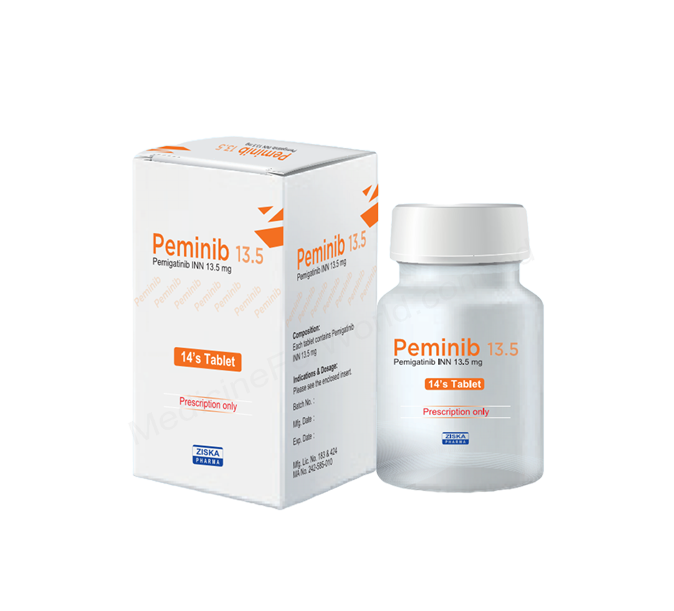Don't miss our holiday offer - up to 50% OFF!
Peminib 13.5 mg tablet

Uses
This medication is used to treat certain types of cancer (such as bile duct cancer, myeloid/lymphoid neoplasms). Pemigatinib works by slowing or stopping the growth of cancer cells. It belongs to a class of drugs known as kinase inhibitors.

How to use Pemigatinib 13.5 Mg Tablet
Read the Patient Information Leaflet if available from your pharmacist before you start using pemigatinib and each time you get a refill. If you have any questions Take this medication by mouth with or without food as directed by your doctor. For the treatment of myeloid/lymphoid neoplasms, this medication is usually taken once daily. For the treatment of bile duct cancer, this medication is usually taken in cycles of 21 days (once daily for 14 days, then stopping the medication for 7 days). Keep taking the medication this way as directed by your doctor.

Side Effects
Dry eyes, loss of appetite, weight loss, mouth sores, dry mouth, changes in taste, nausea, vomiting, diarrhea, constipation, tiredness/weakness, headache, or dry skin may occur. If any of these effects last or get worse, tell your doctor or pharmacist promptly.
To relieve or prevent dry eyes, use lubricating eye drops or gel (such as artificial tears).
Temporary hair loss may occur. Normal hair growth should return after treatment has ended.
People using this medication may have serious side effects. However, you have been prescribed this drug because your doctor has judged that the benefit to you is greater than the risk of side effects. Careful monitoring by your doctor may decrease your risk.
Tell your doctor right away if you have any serious side effects, including: vision changes (such as blurred vision, seeing floaters/flashes of light), signs of high phosphate levels (such as muscle cramps, mental/mood changes, numbness/tingling around the mouth), nail problems (such as loosening of nail), stomach/abdominal pain, yellowing eyes/skin, signs of kidney problems (such as change in the amount of urine), signs of infection (such as fever, chills), chest pain, shortness of breath, joint pain, tingling/burning/swelling of the hands/feet, signs of dehydration (such as extreme thirst, dizziness, fainting), unusual tiredness, easy bruising/bleeding.
Interactions
Drug interactions may change how your medications work or increase your risk for serious side effects. This document does not contain all possible drug interactions. Keep a list of all the products you use (including prescription/nonprescription drugs and herbal products) and share it with your doctor and pharmacist. Other medications can affect the removal of pemigatinib from your body, which may affect how pemigatinib works. Examples include rifamycins (such as rifampin, rifabutin), drugs to treat seizures.
Overdose Notes
Do not share this medication with others.
Lab and/or medical tests (such as eye exam, blood mineral levels, liver/kidney function, complete blood counts) should be done before you start taking this medication and while you are taking it. Keep all medical and lab appointments. Such as phenytoin, carbamazepine, phenobarbital), St. John’s wort, among others.
Missed Dose
If you miss a dose, take it as soon as you remember. If it is more than 4 hours after the missed dose, skip the missed dose. Take your next dose at the regular time. Do not double the dose to catch up.
Storage
Store at room temperature away from light and moisture. Do not store in the bathroom. Keep all medications away from children and pets.

